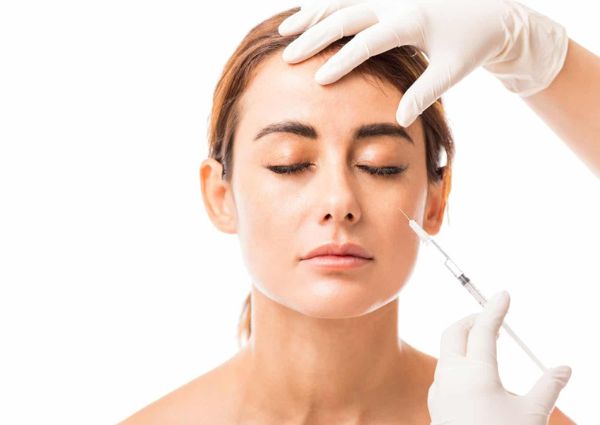Makeup And Skin Health: Separating Fact From Fiction

Table of Contents
The Impact of Ingredients: Understanding Your Makeup Labels
Choosing the right makeup is crucial for maintaining healthy skin. Understanding the ingredients in your products is the first step towards achieving a positive relationship between makeup and skin health.
Comedogenic Ingredients and Acne
Comedogenic ingredients are those that are likely to clog pores, leading to blackheads, whiteheads, and potentially acne breakouts. Common comedogenic ingredients include coconut oil, shea butter, and certain mineral oils. The level of comedogenicity varies depending on the individual, but it's wise to exercise caution.
- Look for products labeled "non-comedogenic" or "oil-free." These labels indicate that the product has been formulated to minimize pore-clogging potential.
- Read ingredient lists carefully and research ingredients you’re unfamiliar with. Many online resources can help you determine the comedogenicity of specific ingredients.
- Consider your skin type. Oily and acne-prone skin may benefit from more lightweight, oil-free formulations.
Irritants and Allergens in Makeup
Many makeup products contain potential irritants and allergens, such as fragrances, preservatives (parabens, for example), and certain dyes. These can trigger redness, itching, burning, or even allergic contact dermatitis in sensitive individuals.
- Choose hypoallergenic and fragrance-free makeup whenever possible. These products are formulated to minimize the risk of irritation.
- Perform a patch test on a small area of skin before applying a new product to your entire face. This allows you to check for any adverse reactions before widespread application.
- Be mindful of ingredients known to be common irritants. If you have sensitive skin, carefully research ingredient lists before purchasing new products.
Beneficial Ingredients: The Skin-Boosting Potential of Makeup
Not all makeup is created equal. Many products now incorporate ingredients that can actually benefit your skin.
- Look for makeup with SPF to protect your skin from sun damage. Sun protection is crucial for preventing premature aging and skin cancer.
- Consider foundations and concealers with hydrating ingredients like hyaluronic acid. These can help keep your skin moisturized and plump.
- Seek out antioxidants like Vitamin C and Vitamin E. These can help protect your skin from free radical damage.
Makeup Application and Hygiene Practices
Proper application and hygiene are just as important as ingredient selection when it comes to makeup and skin health.
The Importance of Clean Brushes and Tools
Dirty makeup brushes and tools are breeding grounds for bacteria, which can lead to skin infections and breakouts.
- Wash brushes at least once a week with a gentle cleanser. There are specialized brush cleaners available, or you can use a mild baby shampoo.
- Replace sponges and applicators regularly. These tend to harbor more bacteria than brushes.
- Allow brushes to air dry completely before storing. This prevents the growth of mold and mildew.
Proper Removal Techniques
Leaving makeup on overnight clogs pores and prevents your skin from properly repairing itself.
- Use a gentle makeup remover suited to your skin type. Oil-based cleansers are great for removing heavy makeup, while micellar water is suitable for sensitive skin.
- Double cleanse for thorough removal, especially when wearing heavy makeup. This involves using an oil-based cleanser followed by a water-based cleanser.
- Always remove eye makeup gently to avoid pulling or tugging on the delicate skin around your eyes.
Debunking Common Myths About Makeup and Skin Health
Let's address some common misconceptions:
- Myth: Makeup causes acne. Fact: While some ingredients can contribute to acne, it's not the makeup itself, but rather the comedogenic ingredients within. Choosing non-comedogenic products is key.
- Myth: All makeup is bad for your skin. Fact: Many makeup products contain beneficial ingredients and provide sun protection. It’s all about ingredient awareness and responsible usage.
- Myth: Expensive makeup is always better. Fact: Price doesn't always equate to quality or suitability for your skin. Focus on ingredient lists and reviews rather than solely price.
Conclusion
Understanding the relationship between makeup and skin health requires a balanced approach. By being mindful of ingredients, practicing good hygiene, and debunking common myths, you can enjoy the benefits of makeup without compromising your skin's health. Start making smarter choices with your makeup today! Select products with beneficial ingredients, prioritize proper hygiene, and read labels carefully to ensure a positive relationship between your makeup routine and your skin health.

Featured Posts
-
 La Liga Santafesina Goles Que Emocionan A Sus Hinchas
Apr 25, 2025
La Liga Santafesina Goles Que Emocionan A Sus Hinchas
Apr 25, 2025 -
 Will Trumps Accusations Boost The South Korean Won Against The Us Dollar Krw Usd
Apr 25, 2025
Will Trumps Accusations Boost The South Korean Won Against The Us Dollar Krw Usd
Apr 25, 2025 -
 Japans Yield Curve Foreign Investors Bets And Swap Market Signals
Apr 25, 2025
Japans Yield Curve Foreign Investors Bets And Swap Market Signals
Apr 25, 2025 -
 Trump Visa Crackdown Spurs College Students To Delete Op Eds
Apr 25, 2025
Trump Visa Crackdown Spurs College Students To Delete Op Eds
Apr 25, 2025 -
 Huntsville Father Sues After Sons Accidental Shooting Death
Apr 25, 2025
Huntsville Father Sues After Sons Accidental Shooting Death
Apr 25, 2025
Latest Posts
-
 Lars Klingbeil Die Neue Fuehrung Der Spd Bundestagsfraktion
Apr 30, 2025
Lars Klingbeil Die Neue Fuehrung Der Spd Bundestagsfraktion
Apr 30, 2025 -
 Coalition Agreement On The Line Germanys Spd Faces Key Party Vote
Apr 30, 2025
Coalition Agreement On The Line Germanys Spd Faces Key Party Vote
Apr 30, 2025 -
 Coalition Deal Imminent German Government Formation Nears Completion
Apr 30, 2025
Coalition Deal Imminent German Government Formation Nears Completion
Apr 30, 2025 -
 German Coalition Deal Midday Announcement Expected Sources Say
Apr 30, 2025
German Coalition Deal Midday Announcement Expected Sources Say
Apr 30, 2025 -
 Spd Coalition Talks Germany Awaits Party Vote Outcome
Apr 30, 2025
Spd Coalition Talks Germany Awaits Party Vote Outcome
Apr 30, 2025
